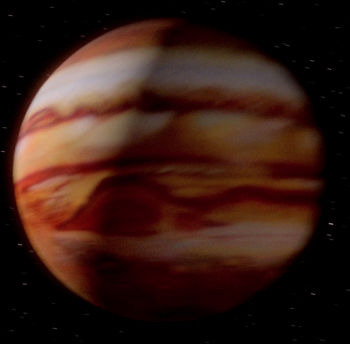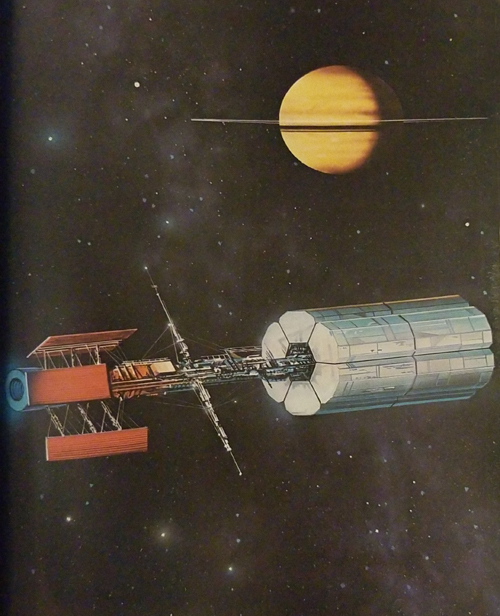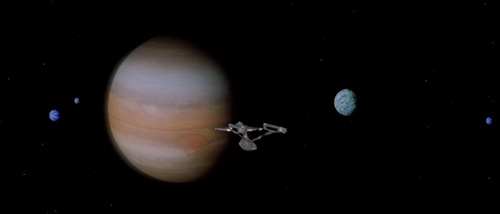Difference between revisions of "Jupiter (FASA)"
m |
m |
||
| (3 intermediate revisions by the same user not shown) | |||
| Line 3: | Line 3: | ||
{{TableRow|title=Coordinates|data=23.9, 61.8, 0.0<ref name="Maps"/>}} | {{TableRow|title=Coordinates|data=23.9, 61.8, 0.0<ref name="Maps"/>}} | ||
{{TableRow|title=Affiliation|data=[[United Federation of Planets]]<ref name="TOS00"/>}} | {{TableRow|title=Affiliation|data=[[United Federation of Planets]]<ref name="TOS00"/>}} | ||
| − | {{TableRow|title=Satellites|data=18 moons,<ref name="WoF"/> including [[#Galilean_Moons|Galilean moons]]: Io (Sol Va), [[Europa (FASA)|Europa]] (Sol Vb), Ganymede (Sol Vc), Callisto (Sol Vd)}} | + | {{TableRow|title=Satellites|data=18 moons,<ref name="WoF"/> including [[#Galilean_Moons|Galilean moons]]: Io (Sol Va), [[Europa (FASA)|Europa]] (Sol Vb), [[Ganymede (FASA)|Ganymede]] (Sol Vc), Callisto (Sol Vd)}} |
{{TableRow|title=Advertising|data={{AmazonLink2}} {{AmazonLinkFASA2011}} }} | {{TableRow|title=Advertising|data={{AmazonLink2}} {{AmazonLinkFASA2011}} }} | ||
|}</div> | |}</div> | ||
{{BannerFASA}} | {{BannerFASA}} | ||
| − | A [[Planetary Classes (FASA)#Class A|Class A planet]],<ref name="WoF"/> Jupiter was the largest planet in the [[Sol system]], and orbits fifth from its parent star.<ref name="TOS37"/> Although Jupiter, being a gas giant, was uninhabitable by humanoid life, its four largest moons, known as the Galilean moons, were colonized by [[Humans (FASA)|Humans]].<ref name="FASA2011"/> | + | A [[Planetary Classes (FASA)#Class A|Class A planet]],<ref name="WoF"/> Jupiter was the largest planet in the [[Sol system]], and orbits fifth from its parent star.<ref name="TOS37"/> Although Jupiter, being a gas giant, was uninhabitable by humanoid life, its four largest moons, known as the Galilean moons, were colonized by [[Humans (FASA)|Humans]].<ref name="FASA2011"/> |
| − | {{ImageBox2|float=left|file=jupiter-st01.jpg|caption=Jupiter and moons ([[Star Trek: The Motion Picture (Film)|ST01]])}} | + | Early exploration of Jupiter began in the [[1960s (FASA)|1960s]] with the [[Pioneer series (FASA)|''Pioneer'' series]] probes, and continued in [[1970s (FASA)#1977|1977]] with the launch of the [[Voyager series (FASA)|''Voyager'' series]] probes, the first of which reached Jupiter two years later. The [[Galileo series (FASA)|''Galileo'' probe]] departed [[Earth (FASA)|Earth]] orbit for Jupiter in [[1980s (FASA)#1982|1982]]. It descended into the Jovian atmosphere behind a heat shield, radioing back data until the increasing pressure crushed the hull, about 30 minutes after entry.<ref name="SFC"/> |
| − | Jupiter | + | |
| + | {{ImageBox2|float=left|boxwidth=25%|file=aventeur_class-sfc.jpg|caption=[[Aventeur class (FASA)|''Aventeur'' class]] ([[Star Trek: Spaceflight Chronology (Book)|SFC]])}} | ||
| + | The first manned Jupiter mission occurred in [[2010s (FASA)#2014|2014]], aboard the [[Aventeur class (FASA)|''Aventeur''-class]] [[U.N.S.S. Lewis and Clark (FASA)|U.N.S.S. ''Lewis and Clark'']]<ref name="SFC"/> under [[U.S. Air Force Ranks#Colonel|Colonel]] [[Christopher, Shaun (FASA)|Shaun Geoffrey Christopher]],<ref name="TOS21"/> which departed on humanity's farthest journey from Earth. In [[2020s (FASA)#2025|2025]], twelve probes were sent into Jupiter's red spot, sending back data showing that it was the result of inner core — and not merely atmospheric — processes. In [[2020s (FASA)#2028|2028]], the Jupiter Base on [[Ganymede (FASA)|Ganymede]] began expanded research into the Sol system's largest planet. In [[2030s (FASA)#2031|2031]], a second Jupiter base on Ganymede joined in the research of the huge planet, while also starting studies of the other Jovian moons.<ref name="SFC"/> | ||
| + | |||
| + | {{ImageBox2|file=jupiter-st01.jpg|caption=Jupiter and moons ([[Star Trek: The Motion Picture (Film)|ST01]])}} | ||
| + | Jupiter roiled with constant storms, the most famous of which, the Great Red Spot, remained one of the planet's most popular sightseeing destinations. The Great Red Spot was <!--first observed through a telescope in the 17th century by [[Galilei, Galileo|Galileo Galilei]]; it was -->still going strong well into the 23rd century.<ref name="ST01"/> | ||
{{References}} | {{References}} | ||
<references> | <references> | ||
| − | <ref name="TOS00">{{ | + | <ref name="TOS00">{{RefTOS01}}</ref> |
| + | <ref name="TOS21">{{RefTOS21}}</ref> | ||
| + | <ref name="TOS37">{{RefTOS37}}</ref> | ||
<ref name="ST01">{{RefST01}}</ref> | <ref name="ST01">{{RefST01}}</ref> | ||
| + | <ref name="SFC">{{RefSFC}}</ref> | ||
| + | <ref name="Maps">{{RefMaps}}</ref> | ||
| + | <ref name="WoF">{{RefWoF}}</ref> | ||
<ref name="FASA2011">{{RefFASA2011}}</ref> | <ref name="FASA2011">{{RefFASA2011}}</ref> | ||
</references> | </references> | ||
Latest revision as of 08:23, 26 April 2023
| Coordinates | 23.9, 61.8, 0.0[1] |
| Affiliation | United Federation of Planets[2] |
| Satellites | 18 moons,[3] including Galilean moons: Io (Sol Va), Europa (Sol Vb), Ganymede (Sol Vc), Callisto (Sol Vd) |
| Advertising |
A Class A planet,[3] Jupiter was the largest planet in the Sol system, and orbits fifth from its parent star.[4] Although Jupiter, being a gas giant, was uninhabitable by humanoid life, its four largest moons, known as the Galilean moons, were colonized by Humans.[5]
Early exploration of Jupiter began in the 1960s with the Pioneer series probes, and continued in 1977 with the launch of the Voyager series probes, the first of which reached Jupiter two years later. The Galileo probe departed Earth orbit for Jupiter in 1982. It descended into the Jovian atmosphere behind a heat shield, radioing back data until the increasing pressure crushed the hull, about 30 minutes after entry.[6]
The first manned Jupiter mission occurred in 2014, aboard the Aventeur-class U.N.S.S. Lewis and Clark[6] under Colonel Shaun Geoffrey Christopher,[7] which departed on humanity's farthest journey from Earth. In 2025, twelve probes were sent into Jupiter's red spot, sending back data showing that it was the result of inner core — and not merely atmospheric — processes. In 2028, the Jupiter Base on Ganymede began expanded research into the Sol system's largest planet. In 2031, a second Jupiter base on Ganymede joined in the research of the huge planet, while also starting studies of the other Jovian moons.[6]
Jupiter and moons (ST01)
Jupiter roiled with constant storms, the most famous of which, the Great Red Spot, remained one of the planet's most popular sightseeing destinations. The Great Red Spot was still going strong well into the 23rd century.[8]
Notes and References
- ↑ Maynard, Jeff (Author). Star Trek Maps. Star Trek. Book. Bantam Books. August 1980.
- ↑ Roddenberry, Gene (Executive Producer). "The Cage". Star Trek, season 0, episode 0 (Production number 01). Directed by Robert Butler. Written by Gene Roddenberry. Released 1986. Desilu Productions. 1965.
- ↑ 3.0 3.1 Johnson, Shane. Star Trek: The Worlds of the Federation. Pocket Books, 1989.
- ↑ Roddenberry, Gene (Executive Producer). "The Changeling." Star Trek, Season 2, Episode 8. Directed by Marc Daniels. Written by John Meredyth Lucas. Desilu Productions, 29 September 1967.
- ↑ Menke, Bernard Edward and Rick David Stuart (Authors). The Federation. Star Trek: The Role Playing Game. Book 2011. Cover art by David R. Deitrick. Illustrations by Todd F. Marsh, John C. Tylk, Bob Eggleton, Daniel E. Carroll, and Jay Harris. FASA Corporation. 1986.
- ↑ 6.0 6.1 6.2 Goldstein, Stan et al (Authors). Spaceflight Chronology. Star Trek. Book. Wallaby Books. 1980.
- ↑ Roddenberry, Gene (Executive Producer). "Tomorrow is Yesterday." Star Trek, Season 1, Episode 19 (Production 21). Directed by Michael O'Herlihy. Written by D.C. Fontana. Desilu Productions, 26 January 1967.
- ↑ Roddenberry, Gene (Producer). Star Trek: The Motion Picture. Directed by Robert Wise. Story by Alan Dean Foster. Screenplay by Harold Livingston. Paramount Pictures. 7 December 1979.




